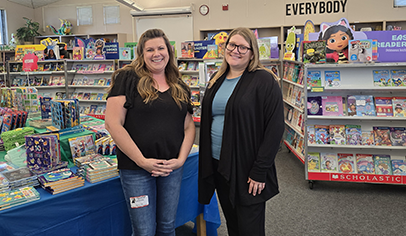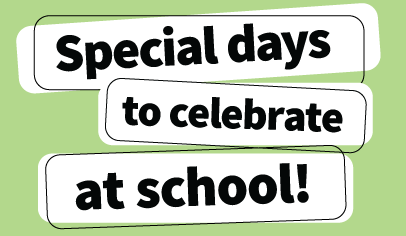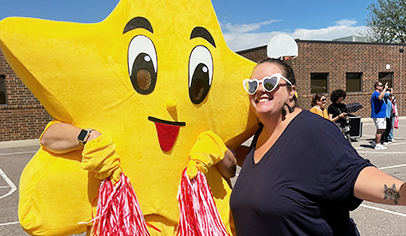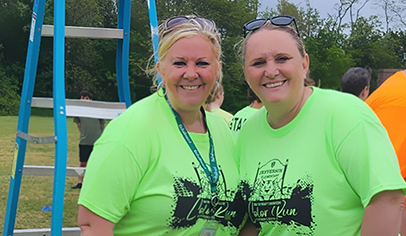Lauri Lewis thought she knew what to expect when she joined the PTO four years ago. She would help run bake sales, school fairs, and teacher appreciation days, right? Well, yes. But she would also raise money for hundreds of thousands of dollars' worth of equipment and capital projects. That got her wondering—what is the PTO's role, anyway? To enrich her kids' educational experience, or to enrich her kids' school?
Increasingly, parent-teacher organizations are funding items that schools say they need but can't afford. Across the country, PTOs are picking up the tab for computers, library books, even instructor salaries and classroom aides. While most agree these items should be paid for with public funds, many PTOers say they're not going to hold their breath waiting for those funds to appear.
Lewis, whose fifth- and seventh-grade children are students in the Brazosport Independent School District in Texas, was stunned her first year on the PTO when the parent group funded a new phonics curriculum. "I was like, 'What does the school provide?' " she says.
Since then, Lewis has watched the district's PTOs pay for a new elementary school track, 20 computers with wireless Internet, a computer lab, an outdoor pavilion for physical education classes, maps, an atomic clock, and library books for the middle school.
Earlier this school year, Lewis headed up the annual Rasco Middle School PTO fundraising drive, which brought in $50,000 through gift-wrap and candy sales. "It sounds absurd, but we almost had trouble spending the money. A teacher could have asked for almost anything," Lewis says. "The schools that my kids go to are better equipped because of the PTO. I think the school board knows the PTO will come through."
And therein lies a problem, according to National PTA President Shirley Igo. While it's understandable—indeed commendable—that parents want to provide big-ticket items for their children's school, it's unfair to do so, she says. Private funds tip the balance of equity in public schools, with students in wealthier communities likely to end up with more than their peers in less well-off districts. "When some schools are able to raise additional funds from outside sources, while other schools are not, we develop a multi-tiered education system that places many of our children at a great disadvantage," Igo explains. "No child's education should depend on where he lives, his socioeconomic condition, or the ability of his community to add to his school's resources."
Others disagree, arguing that providing the best resources for their children can't be a bad thing.
A Budget Band-Aid?
Private donations to public schools are not new phenomena, although lately, parent groups have edged into a more central funding role, largely because of budget cuts. Many states have adopted tax limitation measures, restricting the amount of money a community can raise for services like education. And with only 20 percent of American families having children in public school, support for increased education funding has fallen off, said S. Paul Reville, who is on the faculty of the Harvard School of Education and is co-director of Harvard's Pew Forum on Standards-Based Reform.
Yet, from the prairie town pioneers who pooled their money to hire a schoolteacher, to the gifts of water fountains and ornamental trees that senior classes buy their schools each year, beneficiaries of public education have felt compelled to give something back. Add to that impulse dwindling public education dollars and the specter of a beloved child doing without, and you get someone like Kevin D. Green Sr., who pounded the pavement in Jackson, Mississippi, to collect donations for the annual PTA raffle. Green, president of the Boyd Elementary School Parent Teacher Association, realized his third-grader would be on to middle school before Boyd got the "computer in every classroom" that the governor has vowed for the state's schools.
So, with the same spirit that drives him to purchase Kleenex, soap, and other essentials for his son's classroom, Green and the PTA set out to buy computers for the school. The raffle brought in $20,000—a high for the Boyd PTA—and 11 new computers are expected to arrive any day.
"The PTA has given us a boost in getting up to date," says Frederick Murray, principal of grades three through five in the 800-student Boyd school. Murray says the PTA's generosity has allowed him to use district funds to reduce class sizes by hiring more teachers.
The children at Boyd do not come from wealthy families; more than 95 percent are eligible for free or reduced lunch. The $20,000 was hard-earned, through the students' salesmanship and the community's support. But some worry that one-time or annual fundraisers like this are a Band-Aid that covers the need for long-term, strategic funding and could lull school boards into ignoring chronic budget shortfalls. As well-meaning and helpful as private donations are, there will never be enough to pay for everything, says Wendy D. Puriefoy, president of the Public Education Network (PEN), a national association of local education funds in Washington, DC. According to Harvard's Reville, if the nation's total charitable foundation dollars replaced public funding of education, America's schools could survive for two to three days before plunging into bankruptcy. "People are trying to solve a big public problem with private money, and it just doesn't work in the long run," says Puriefoy.
The community's enthusiasm for equipping schools should be redirected toward advocating for increased public funding, Puriefoy says. Not only do public dollars reflect the public's priorities, but they also ensure consistency that most PTOs can't, she explains. The Rasco Middle School PTO has no long-term strategy because the school serves only two grades. The entire PTO changes over every few years. "There's no long-range plan," Lewis says. "Every couple of years, a new group of parents shows up and says, 'OK. How can we spend this money?' "
Puriefoy's advice is, "As a PTO, ask yourself the larger question: 'What happens after my kids are gone?' If something is going to have an impact, it has to be structured, regular, systematic."
Parents as Philanthropists
The Gates Elementary School in Acton, Massachusetts, seems not to suffer from continuity issues. The school, which serves 508 students in grades K–6, has a PTO that has paid for a Spanish instructor for the last nine or 10 years. It also funds 39 hours per week of classroom assistants. Interim Principal Walter McGrail explains that the PTO has a sort of succession plan, where the co-chair serves with the chair for a time before taking over the helm. This ensures an uninterrupted link with the past. The PTO has avoided running afoul of the teachers' union by limiting its support to part-time, noncertified positions.
While the Gates PTO has apparently worked out a conflict-free way to fund personnel, there are districts that are so concerned with the potential for problems that they have clear rules about what sort of help they will accept from parents. The Newton, Massachusetts, public schools have an "equity cap," which limits the amount of money parent groups can donate for certain items. Technology was removed from the cap when budgets got tight, so last year the Mason Rice elementary school parent group launched a capital campaign after realizing that, of the city's 15 elementary schools, its was among the most poorly equipped. Through letters, information nights, and coffees, the PTO raised $70,000 to buy computers and audio-visual equipment. This year, some of the city's other PTOs tried to organize similar fundraisers, bringing inequity concerns back to the surface and sparking a movement to put technology back under the equity cap.
"We're at loggerheads," says Mason Rice PTO Co-Chair Kathy Berman. "But the point is good. I don't support PTOs taking this on." Berman says the citywide PTO council has been meeting to work out the issue, and she hopes its members can figure out a way to make sure every school is equipped at the same level.
When Paul Houston was superintendent of the Princeton, New Jersey, public schools, he had a policy limiting parent support to nonessential activities, such as enrichment. Still, Houston, now executive director of the National Association of School Administrators, says he's glad he wasn't on the receiving end of an offer that a California rock star once told him about. The man (whose name Houston, out of courtesy, won't reveal) was unhappy with what he felt was the unhealthy food his child's public school cafeteria served. The musician offered to hire a macrobiotic chef. When the superintendent told him that wouldn't be fair to the other schools in the district, he offered to give a benefit concert to pay for macrobiotic chefs for each of the schools.
"If I were the superintendent, I don't know what I would've done in that situation," Houston says, then adds that he probably would have encouraged the parent to lobby the school board to allocate more funds toward healthier school meals.
That's the advice Puriefoy has. And while parents like former Mason Rice PTO Co-Chair Bonnie Ciambotti agree that's the best route, they're acutely aware of the clock ticking on their children's public school years. By the time they work their requests up through the bureaucratic layers, chances are their kids will be on to another school. "Our computers were so old and slow. The teachers were so frustrated, they could barely even use them," Ciambotti says. "We knew if we waited for the school department to fund the computers, we just wouldn't get them."
Whether or not it's in society's best interest to have parents acting as private philanthropists, one thing's for certain: They're not going to stop anytime soon. Dire needs and enthusiastic parents make for a potent mixture.
"The issue has been around for a long time, and it ebbs and flows with the economy," Houston says. "I think this will be coming up more often now."
The PTO Today Take
It's an age-old question: Where should we draw the line between a school or district's financial responsibilities and the fundraising role of a parent group? Like the bumper sticker says, "It will be a great day when our schools get all the money they need and the Air Force has to hold a bake sale to buy a bomber."
While we agree with that sentiment, the reality is that parent groups across the country are playing a key role in providing valuable extras for children—more than $2 billion worth of playgrounds and computers and field trips per year, at last count. That can't be a bad thing.
The most effective parent groups can aim for success in both areas. By reaching out and engaging your entire community in the education cause, you'll make strides toward increased district-level funding and equality, and—as a nice side benefit—your next fundraiser will be even more successful. It doesn't have to be an either-or proposition.
Why can't we have fully funded schools and enthusiastic parent groups providing even more? Now that's a goal to strive for.
The I's Have It
When S. Paul Reville was executive director of the Alliance for Education in Worcester, Massachusetts, he helped spearhead a $4.5 million tax override for the schools. Convincing taxpayers to support local education in a blue-collar city of 170,000 was the result of a long-term campaign of public engagement.
Reville says the PTO is a natural body to advocate for a higher level of school funding. He recommended parents embark on a basic "three I's" marketing strategy of gaining the community's interest, involvement, and investment in the schools.
Interest community members in the issues your school is facing by helping them make the connection between the community's vitality and the health of the schools. According to a recent survey by the Public Education Network and Education Week, most Americans agree that the nation's success depends on a well-educated citizenry.
Involve people in the schools with special programs and volunteer opportunities. Reville's organization invited local policy makers into the schools to be principal for a day. Other ideas include recruiting senior citizen volunteers and hosting community reading days, during which local dignitaries and others visit classrooms as guest readers.
When people feel a sense of ownership in the public schools, they'll be more likely to invest their time and tax dollars in education.
"It's a different way for the PTO to think of its mission," Reville says. "What you really should be about is getting critical people in your community interested in making a financial commitment."
Before embarking on the three I's, the PTO must educate itself about the issues its school faces.
Questions to ask are: What are the system's learning goals for the children? Are those goals being met? If not, how will they be met? Does the budget reflect these goals? What resources do we have?
"PTOs need to say, 'The work we have to do is to help citizens understand the relationship the schools have to the quality of life,' " says Wendy Puriefoy, president of the Public Education Network. "Generally people know more about buying a car than they do about the way their child's school system works."















